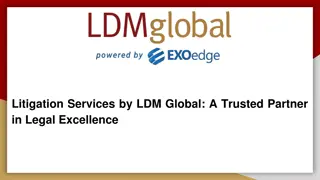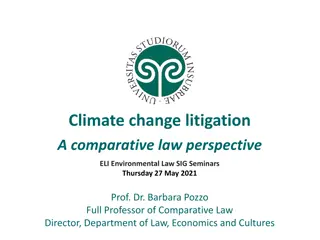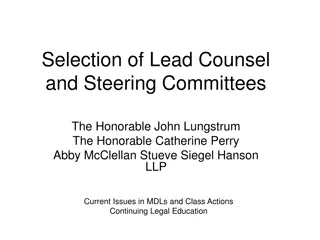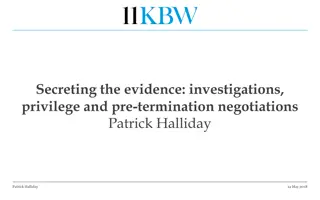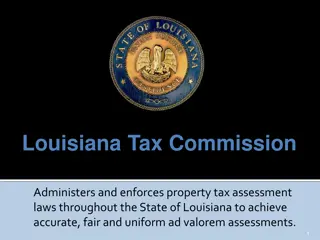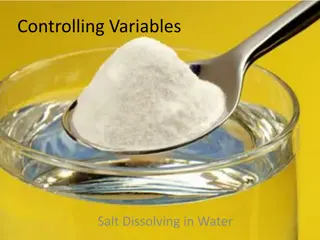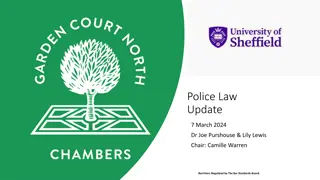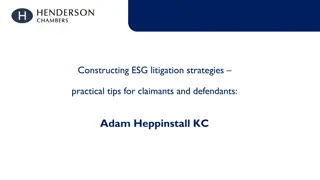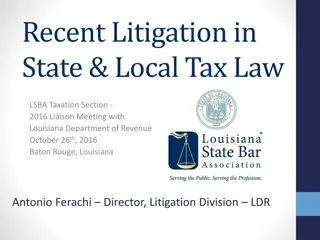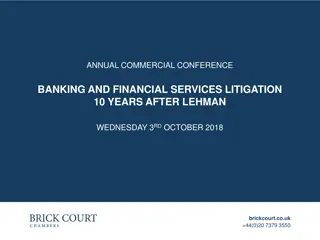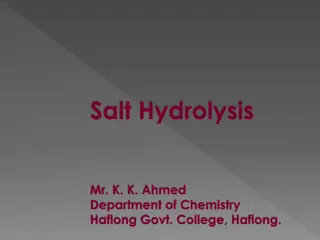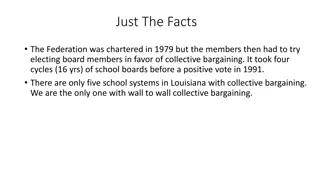Louisiana SALT Litigation Update: Recent Cases and Developments
This update provides insights into recent Louisiana SALT (State and Local Tax) litigation cases, including decisions from the Louisiana Supreme Court and pending cases before the court. The summary covers challenges to occupational license taxes, constitutional issues related to tax credits, and disputes over sales tax refunds. Get a comprehensive overview of the legal landscape impacting tax matters in Louisiana.
Download Presentation

Please find below an Image/Link to download the presentation.
The content on the website is provided AS IS for your information and personal use only. It may not be sold, licensed, or shared on other websites without obtaining consent from the author. Download presentation by click this link. If you encounter any issues during the download, it is possible that the publisher has removed the file from their server.
E N D
Presentation Transcript
A View from the Bench: Louisiana SALT Litigation Update for the State and Local Tax Workshop, September 28, 2018 Judge Tony Graphia, Chairman, Louisiana Board of Tax Appeals Cade R. Cole, Vice-Chairman, Louisiana Board of Tax Appeals, and Local Tax Judge Francis Jay Lobrano, Member, Louisiana Board of Tax Appeals
Louisiana SALT Litigation Update 1. Decisions of the Louisiana Supreme Court 2. Pending appeals before the Louisiana Supreme Court 3. Litigation Update: Louisiana Board of Tax Appeals and Louisiana Courts of Appeal
1. Decisions of the Louisiana Supreme Court Beer Industry League of Louisiana v. City of New Orleans, 2018- 0280 (La. 6/27/18) Facts: New Orleans sought to levy an occupational license tax or excise tax on dealers of alcoholic beverages (i.e., a gallonage tax ). Plaintiffs challenged the constitutionality, arguing that the new levy was an unauthorized occupational license tax ( OLT ). Orleans CDC held that the City s gallonage tax was unconstitutional. Holding: Reversed. The Court concluded that (a) the State s gallonage tax is an OLT on dealers for the privilege of handling high alcoholic content beverages, (b) the City s gallonage tax also is an OLT on dealers engaged in the handling of high alcoholic content beverages, and (c) the City s gallonage tax is permitted so long as it does not exceed the amount of the State s gallonage tax.
2. Pending Louisiana Supreme Court Cases Ulrich et. al. v. Robinson, 2018-CA-534 (Constitutionality 2015 La. Act 131, Solar Tax Credit limit). Smith v. Robinson, 2018-CA-728 (Constitutionality of 2015 La. Act 109, elimination of credit for net income tax paid to other states without reciprocal credit, reduction of credit to amount of tax under Louisiana law). Oral argument for both cases is scheduled for October 17, 2018.
3. Litigation Update BTA and Court of Appeal cases
Metals USA Plates & Shapes Southeast, Inc. v. Louisiana Dept of Revenue, 2017-699 (La. App. 3 Cir. 3/21/18), 240 So.3d 1016, 1021 Facts: Taxpayers sought refunds for sales tax paid on purchases of welding gases from 2011 to 2014. LDR denied refund requests. Taxpayers argued that the welding gases qualified for the manufacturing exclusion applicable to fuel or gas found in R.S. 47:301(10)(x). In 2008, the Legislature amended R.S. 47:301(10)(x) twice on the same day by passing House Bill 1 (Act 1) and Senate Bill 7 (Act 9).
Metals USA Plates & Shapes Southeast, Inc. v. Louisiana Dept of Revenue, 2017-699 (La. App. 3 Cir. 3/21/18), 240 So.3d 1016, 1021 House Bill 1 (Act 1) Senate Bill 7 (Act 9) LSLI Published Version For purposes of the sales and use tax imposed by the state or any political subdivision boundaries are coterminous with those of the state, the terms retail sale or sale at retail shall not include the following: (i) The sale or purchase by a consumer of any fuel or gas, including but not limited to butane and residential consumer. (ii) Beginning July 1, 2008, the sale or purchase by any person of propane. For purposes of the sales and use tax imposed by the state or any political subdivision whose boundaries coterminous with those of the state, the terms retail sale or sale at retail include the sale or purchase by a consumer person of any fuel or gas, including but not limited to butane and propane for residential use by the customer. For purposes of the sales and use tax imposed by the state or any political subdivision whose coterminous with those of the state, the terms retail sale or sale at retail shall not include the following: (i) The sale or purchase by a consumer person of any fuel or gas, including but not limited to butane and residential use by the customer.. (ii) (ii) Beginning July 1, 2008, the sale or purchase by any person of butane and propane. whose boundaries are are shall not propane use for the by propane for butane and
Metals USA Plates & Shapes Southeast, Inc. v. Louisiana Dept of Revenue, 2017-699 (La. App. 3 Cir. 3/21/18), 240 So.3d 1016, 1021 The legislative histories of both amendments were nearly identical: House Bill 1 (Act 1) Signed by Governor: March 24, 2008 Pre-Filed: March 7, 2008 Voted on & Passed House: March 12, 2008 Voted on & Passed Senate: March 14, 2008 Senate Bill 7 (Act 9) Signed by Governor: March 24, 2008 Pre-Filed: March 7, 2008 Voted on & Passed House: March 12, 2008 Voted on & Passed Senate: March 14, 2008
Metals USA Plates & Shapes Southeast, Inc. v. Louisiana Dept of Revenue, 2017-699 (La. App. 3 Cir. 3/21/18), 240 So. 3d 1016, 1021 Welding gases were excluded from sales tax under House Bill 1 and the LSLI s version of the statute, but not under Senate Bill 7 version. Board found that the disparate tax treatment under the two amendments ipso facto created a conflict. Board found that the LSLI had exceeded the scope of its authority by publishing a hybrid statute. Board resolved the conflict by looking to the latest expression of the legislature s will. Board rendered judgment in the Department s favor and Taxpayers appealed to the Third Circuit and Fifth Circuit. Third Circuit upheld Board, and Supreme Court recently denied writes, Fifth Circuit appeal is pending.
Avanti Exploration, LLC, Board No. 9608D (12/6/17) Taxpayer sold oil from the field to customers who loaded the oil into their own trucks and carried it to market. Customers paid a reduced price in consideration of the distance between the field and the market, and the risk of loss in transportation. The contracts were negotiated at arms length. In addition, there was no posted field price at the location of the Taxpayer s well. LDR assessed additional severance tax on the grounds that a deemed transportation discount should have been included in the Taxpayer s gross receipts. LDR also asserted that the Taxpayer received an in kind benefit from its customers of equal value to the amount of the discount.
Avanti Exploration, LLC, Board No. 9608D (12/6/17) Holding: Board granted the Taxpayer s motion for summary judgment. Board found that the Taxpayer s gross receipts could only include what the Taxpayer was actually paid. The Board noted that severance tax is imposed on the value of oil at the time and place of severance. Severance in this case occurred at the field, so the tax was properly calculated based on the oil s value at that location. The oil s value at a market center would necessarily be different. Including the phantom amount in the Taxpayer s gross receipts would essentially impose a tax on the market center value of the oil instead of the oil s severance value Department appealed to the Third Circuit. Appeal pending.
Robinson v. Mantle Oil & Gas, LLC, 2017-0894 (La. App. 1 Cir. 3/29/10), 247 So.3d 738, 741, reh g denied (Apr. 23, 2018) Facts: The Department assessed severance tax on the Taxpayer s sales of oil from wells in Assumption Parish and Allen Parish. Taxpayer sold oil from its Assumption Parish well to a purchaser who picked up the oil in its own trucks from the Taxpayer s tanks in the field. Pursuant to a written agreement, the purchaser deducted $1.80 per barrel from the purchase price before payment. This discount represented the costs borne by the purchaser in transporting the oil from the field to market. The Taxpayer sold oil from its field in Allen Parish at the Plains South Louisiana Swett Posted Price, plus a premium. With respect to the Ascension Parish well, the Department took the position that the $1.80 discount should have been included in the Taxpayer s gross receipts for severance tax purposes. The Department argued that the discount was not a deductible transportation cost. With respect to the Allen Parish well, the Department calculated severance tax based on its own area price. Specifically, the Platts US Crude Wire Oil index at LLS Oil Spot at St. James Terminal price. There was no posted field price at the Allen Parish well. The Taxpayers successfully moved for summary judgment and the Department appealed to the First Circuit.
Robinson v. Mantle Oil & Gas, LLC, 2017-0894 (La. App. 1 Cir. 3/29/10), 247 So.3d 738, 741, reh g denied (Apr. 23, 2018) Holding: First Circuit affirmed, holding that Taxpayer never actually received the $1.80 per barrel R.S. 37: 633(7)(a), taxes on value of the products severed at the time and place of severance. The value of the products shall be the higher of (1) the gross receipts received from the first purchase, less charges for trucking, barging and pipeline fees, or (2) the posted field price. The Court found the plain and ordinary meaning of the term Gross Receipts to encompass only amounts actually received. $1.80 per barrel discount was deducted before payment, it was never actually received by the Taxpayer.
Robinson v. Mantle Oil & Gas, LLC, 2017-0894 (La. App. 1 Cir. 3/29/10), 247 So.3d 738, 741, reh g denied (Apr. 23, 2018) The Court also affirmed the grant of summary judgment with respect to the Allen Parish well. On that issue, the Department argued that the Taxpayer could not prove that it had used the correct price in calculating the tax, and that the Taxpayer should have used a higher posted field price. Because there was no posted field price at the Allen Parish well, the Department used a substitute area price. The Court found that the Department had not demonstrated that its area price was calculated in accordance with LAC 61: I.2903A. The Department did not show that it made the required adjustments to the area price, such as adjustments for kind or quality of the oil. In the absence of a posted field price, the Court found that the Taxpayer was entitled to calculate the tax based on gross receipts.
Duncan Oil, Inc. v. Calcasieu Parish School Board, 17-488 (La. App. 3 Cir. 2/28/18), 239 So.3d 367 Facts:Calcasieu Parish School Board ( CPSB ) assessed the Taxpayer with sales tax on invoices for the removal of paraffin deposits from tubing used to extract hydrocarbons from its wells. Taxpayer asserted that the paraffin removal should be classified as a non-taxable cleaning service rather than a taxable repair. Taxpayer relied on Intracoastal Pipe Service, Co. Inc. v. Assumption Parish Sales and Use Tax Dept., 558 So.2d 1296 (La. App. 1 Cir. 1990) where the First Circuit held that cleaning oil field pipe or tubing was not a taxable service. CPSB argued that without the paraffin removal the pipe would be unusable for its intended purpose.
Duncan Oil, Inc. v. Calcasieu Parish School Board, 17-488 (La. App. 3 Cir. 2/28/18), 239 So.3d 367 Holding: Third Circuit noted its agreement with the Board s acceptance of CPSB s argument that the present facts were different from Intracoastal Pipe in that the removal of the paraffin from the pipe was a taxable repair. Hydrocarbons cannot flow through the pipe without the paraffin removal, therefore paraffin removal was a repair as contemplated by R.S. 47:301(14)(g) and was therefore a taxable service. Takeaway: The lesson is that taxpayers have the burden of proof to overcome an appealed assessment and must be prepared to submit appropriate and admissible evidence to show the facts of their case.
Louisiana Dept of Revenue v. Apeck Constr., Inc., 2017-738 (La. App. 3 Cir. 2/28/18), 238 So.3d 1045, 1053 The two substantive issues presented by this appeal were (1) the applicability of the resale exclusion to materials sold for use in construction; and (2) whether aggregate product railway charges for transfers between related entities should be included in the taxable sales price. Facts (resale issue): The Department assessed sales and use tax on materials that the Taxpayer sold for use in construction at Fort Polk. The Taxpayer appealed and argued that the materials were purchased for resale, and alternatively, that it had relied in good faith on the purchaser s exemption certificates relating to a contract with the federal government. The Department took the position that the sale of materials was incidental to the Taxpayer s performance of a construction contract. The Taxpayer provided materials and labor to its customer, a construction contractor working for the federal government. The contracts between the customer and the federal government stated that risk of loss of materials transferred upon delivery to the worksite. These risk of loss provisions were incorporated into the customer s contracts with the Taxpayer. The contract between the Taxpayer and the customer stated that the Taxpayer would be paid within 30 days after final acceptance of the project. However, in practice, the Taxpayer was regularly paid for materials upon delivery at the worksite, before the construction work was performed. The District Court rendered judgment in favor of the Taxpayer on the resale issue, and the Department appealed to the Third Circuit.
Louisiana Dept of Revenue v. Apeck Constr., Inc., 2017-738 (La. App. 3 Cir. 2/28/18), 238 So.3d 1045, 1053 Holding: The Third Circuit affirmed the judgment with respect to the resale exception because title to the materials transferred upon delivery at the worksite, before the materials were consumed in the construction project. The Court found that the risk of loss provisions in the contract between the customer and the federal government were effectively incorporated into the contract between the customer and the Taxpayer. These provisions were explicitly referenced by, and attached to, the Taxpayer s contract. Under the incorporated provisions, risk of loss transferred upon delivery. The Court was not swayed by a contractual provision providing for payment after final acceptance of the Taxpayer s work. Uncontroverted testimony at trial established that, in practice, the Taxpayer was paid on a monthly basis, before the final completion of the work.
Louisiana Dept of Revenue v. Apeck Constr., Inc., 2017-738 (La. App. 3 Cir. 2/28/18), 238 So.3d 1045, 1053 Facts (sales price issue): The Department also assessed sales and use tax on railroad leasing charges accrued by related entities in moving aggregate products from Texas into Louisiana. The related entities passed these costs on to the Taxpayer. The Department asserted that the railroad leasing charges, though not taxable as to the related entities, became taxable once passed on to the Taxpayer. R.S. 47: 305.50 provides that sales and use tax does not apply to the lease of rail rolling stock. However, LAC 61: I.4301, states that the freight or shipping costs of bringing a product to market may not be excluded from the taxable sales price.
Louisiana Dept of Revenue v. Apeck Constr., Inc., 2017-738 (La. App. 3 Cir. 2/28/18), 238 So.3d 1045, 1053 Holding: The Third Circuit affirmed judgment in the Taxpayer s favor, holding that the Department had failed to carry its burden of proving that the rail lease charges were taxable. The Court adopted the Fourth Circuit s conclusion that the statutory definition of sales price does not provide for the inclusion of transportation and freight charges as part of the taxable base, citing Pontchartrain Materials Corp. v. Plaquemines Parish Government, 03-1444 (La. App. 4 Cir. 3/31/04), 871 So.2d 1171, writ denied, 04-1093 (La. 9/3/04), 882 So.2d 606 and writ denied, 04-1152 (La. 9/3/04), 882 So.2d 607. The Court further found no legislative or jurisprudential basis for treating freight in as part of the sales price.
Zelia, LLC v. Robinson, 2018-0011 (La. App. 1 Cir. 5/14/18); Zelia, LLC v. Robinson, 2018-0015 (La. App. 1 Cir. 5/14/18); VCS, LLC v. Robinson, 2018-0012 (La. App. 1 Cir. 5/14/18) Facts:Louisiana Economic Development ( LED ) Enterprise Zone contracts. LED claimed that the Taxpayers did not qualify to receive the payments, and pursuant to R.S. 51: 1787(I), asked the Department to recoup payments already been made. LDR assessed the Taxpayers. Taxpayers appealed the assessments, naming LDR, LED, and Board of Commerce and Industry ( BC&I ). Taxpayers specifically requested that the BTA order the LED and BC&I to reinstate the LED contracts. All defendants filed exceptions of lack of subject matter jurisdiction, no right of action, and no cause of action. The Board determined that it had jurisdiction over the Taxpayer s appeal of the underlying assessment, and that the Taxpayer had a right of action to bring the claims asserted. Board found that the Taxpayer s contract claims went beyond the scope of the dispute over the assessments. Accordingly, the Board dismissed the Taxpayers claims relating to the reinstatement of the LED contracts, but left LED and BC&I in as parties under its incidental demand jurisdiction.
Zelia, LLC v. Robinson, 2018-0011 (La. App. 1 Cir. 5/14/18); Zelia, LLC v. Robinson, 2018-0015 (La. App. 1 Cir. 5/14/18); VCS, LLC v. Robinson, 2018-0012 (La. App. 1 Cir. 5/14/18) Holding: The First Circuit granted a writ. According, to the First Circuit, the contract dispute was the primary issue with respect to the LED and BC&I, the assessments were a secondary issue. First Circuit dismissed the LED and BC&I from the suit entirely. LDR remains a defendant. The cases are currently pending before the Board.
Computation of Time 2018 Act No. 128 amended Code of Civil Procedure Article 5059 effective August 1, 2018: Computation of Time A. In computing a period of time allowed or prescribed by law or by order of court, the date of the act, event, or default after which the period begins to run is not to be included. The last day of the period is to be included, unless it is a legal holiday, in which event the period runs until the end of the next day which is not a legal holiday. B. A half-holiday is considered as a legal holiday. A legal holiday is to be included in the computation of a period of time allowed or prescribed, except when: (1) It is expressly excluded; (2) It would otherwise be the last day of the period; or (3) The period is less than seven days. C. (1) A legal holiday shall be excluded in the computation of a period of time allowed or prescribed to seek rehearing, reconsideration, or judicial review or appeal of a decision or order by an agency in the executive branch of state government. (2) Subparagraph (1) of this Paragraph shall not apply to the computation of a period of time allowed or prescribed to seek rehearing, reconsideration, or judicial review or appeal of a decision or order by the Department of Revenue.
Renew Country of Louisiana Two Corp., Board No. 9262 c/w Renew Country of Louisiana Three Corp., Board No. 9261 (2/7/18) Facts: LDR assessed sales/lease tax on solar energy system income tax credits. Taxpayers leased solar energy systems to home owners. Taxpayers, as owners of the systems, claimed and received the corresponding solar credits. LDR argued that the credits received were subject to lease tax. LDR relied on LAC 61: I.1907(C)(4), which states that for a taxpayer other than the owner of a residence to claim a solar credit, that taxpayer must provide LDR with a copy of a contract stating that the owner of the residence is not entitled to, and will not claim, the tax credit, and transfers their right to claim the credit to the installer, developer, or third party taxpayer. Board found that the evidence adduced at trial demonstrated the Taxpayers entitlement to the credit, and that LAC 61: I.1907(C)(4) was inapplicable to the facts of the case. Board further found no authority for imposing Louisiana s lease tax on the value of the tax credits given directly to the Taxpayers. The Department appealed to the Second Circuit, where the cases are awaiting briefs, Docket Nos. 52531-CA and 52532-CA.
Smith International, Board No. 10498D (4/10/18) Facts:Taxpayer appealed the LDR s assessment of late payment and negligence penalties related to its CIFT return for the tax periods December 31, 2008 to December 31, 2010. Taxpayer s returns were timely filed and the Taxpayer paid the amount shown to be due. LDR argued that Act 128 of the 2015 Regular Session allowed the negligence penalty to be assessed.
Smith International, Board No. 10498D (4/10/18) Holding: Board held that both the late payment and negligence penalties were improperly assessed and rendered judgment in favor of the Taxpayer. Board found that R.S. 47: 1602 plainly penalized only the failure to remit the amount of tax shown to be due on the return. The Taxpayer did not fail to remit this amount, thus there was no basis for assessing the late payment penalty. Board held that Act 128 could not be applied retroactively in this case. Act 128 stated on its face that became effective on July 1, 2015, and contained no explicit provision stating that it was to be applied retroactively. Board therefore looked to the codal provision that substantive laws are not applied retroactively. Board cited the Louisiana Supreme Court for the proposition that laws that penalize an act which was not previously punishable, or increase the penalty for that act, are applied prospectively only. The Board found Act 128 to be penal in nature; the Act increased the penalty for understated tax liability from 5% to 10%, and dispensed with the requirement of willful negligence or intentional disregard of rules or regulations. LDR appealed the judgment to the First Circuit. That appeal is currently pending.
Willis-Knighton Med. Ctr., Board No. 9734D (11/8/17) Facts: Acts 25 and 26 of the 2016 1st Extraordinary Session suspended almost all exemptions and exclusions, including those for prescription drugs and medical devices. Louisiana Constitution Art. VII, 2.2, precludes the imposition of state sales tax on prescription drugs. Taxpayer paid sales tax on medical devices under protest and filed an action to recover the taxes on the grounds that the state sales tax definition of drugs includes both pharmaceuticals and medical devices.
Willis-Knighton Med. Ctr., Board No. 9734D (11/8/17) Holding:The Board found the phrase prescription drugs to be clear and unambiguous. Based on the definitions offered and ordinary understanding of the meaning of prescription drugs, the Board found no basis for including medical devices within the scope of the constitutional exemption. The BTA reached the same conclusion under identical facts in Lafayette Gen. Med. Center, Inc. v. Robinson, Board No. 10437D (7/11/18), pending on appeal to the Third Circuit.
Adamek, Board No. 10475D (3/6/18) Facts: The Taxpayer, an individual, appealed from an assessment of additional individual income tax for the year 2012, arising from an audit and the Department s subsequent disallowance of certain capital gains deductions. On April 28, 2016, the Department sent a Notice of Proposed Tax Due to the Taxpayer s personal residence by regular mail. The Taxpayer responded with a timely written protest. However, the Department did not change its position. On October 6, 2016, the Taxpayer received an e-mail from the Department stating that a formal assessment was forthcoming. On November 21, 2016, the Department sent a Notice of Assessment to the Taxpayer s last known address by certified mail. The notice was not delivered, and was returned unclaimed on January 5, 2017. On February 1, 2017, the Taxpayer received a seizure notice letter. This was the first time the Taxpayer received notice that additional tax had been assessed. On February 10, 2017, counsel for Taxpayer received a copy of the Notice of Assessment, marked Return to Sender Unclaimed Unable to Forward. The Taxpayer appealed the assessment to the Board on February 13, 2017. The Department filed exceptions of no right of action, no cause of action, lack of subject matter jurisdiction, and peremption.
Adamek, Board No. 10475D (3/6/18) Holding:A split Board overruled the Department s exceptions due to a lack of a majority (Cole absent). Graphia held that the LDR specific actions in this case violated the Taxpayer s right to Due Process under Jones v. Flowers, 547 U.S. 220 (2006), holding that Due Process required a tax assessor to resend an assessment by regular mail when the assessor knew that delivery via certified mail had failed.
Adamek, Board No. 10475D (3/6/18) Concurrence: Board Member Jay Lobrano authored a concurring opinion, agreeing in the judgment solely because of the absence of a majority. Otherwise, the concurrence was a dissent that would have sustained the exception of peremption. The Concurrence found Jones to be distinguishable because it dealt with an ad valorem property tax assessment, not an income tax assessment. To resolve the Due Process issue, the Concurrence looked to Philips v. Commissioner, 283 U.S. 589 (1931). In Philips, a taxpayer argued that the right to petition the Board of Tax Appeals (predecessor to the U.S. Tax Court) did not satisfy Due Process because: (1) he would be required to furnish bond to enjoin collection of the tax if he wished to appeal the Board s decision; and (2) the Board s factual findings were not subject to judicial review if there was any evidence to support them.
Adamek, Board No. 10475D (3/6/18) Concurrence (cont d): The Concurrence framed the Due Process issue as a question of whether the Taxpayer had an adequate post-deprivation remedy available. The only post-deprivation remedy available in this case was the Claim Against the State procedure. In Church Point v. Tarver, 614 So. 2d 697 (La. 1993), the Louisiana Supreme Court expressly concluded that the Claim Against the State procedure provides a complete and adequate remedy to a taxpayer who has paid an illegal tax to the state. Concurrence acknowledged the many shortcomings of the procedure, but found the Louisiana Supreme Courts decision in Church Point controlling.
Adamek, Board No. 10475D (3/6/18); Legislative Response The Legislature subsequently amended the statutory notice provisions. Act 143 of the 2018 Regular Session added Subsection (D) to R.S. 47:1565.
Adamek, Board No. 10475D (3/6/18); Legislative Response Takeaways: LDR has the option to send an assessment by regular mail, and proof of this mailing (within 5 business days of the certified mailing) creates a presumption that the assessment was received even if the certified mail is returned. If LDR DOES NOT send an assessment by this additional optional means, the certified mail assessment is still valid and collectable, but the Taxpayer would retain a refund right after payment/seizure.
Adamek, Board No. 10475D (3/6/18); Legislative Response Other changes in Act 143: A Similar provision was added to the ULSTC notice provision, R.S. 47: 337.51(D). The ULSTC version has some slight differences. For example, the regular mailing must be accomplished on the same day as the certified mailing to create a presumption of delivery. Additional Subsections were added to the overpayment refund provisions in R.S. 47: 1621(J) and 337.77(H). These provisions authorize refunds of overpayments on amounts paid on certain otherwise final assessments. However, the Taxpayer (or dealer) cannot obtain a refund under these provisions unless it establishes that it did not receive the assessment, and that the Department or Collector did not comply with R.S. 47:1565(D) or 337.51(D).
Blakewood, LLC v. East Baton Rouge, Board No. L0428 47:301(16)(g) provides that factory built homes are considered tangible personal property for the purposes of sales and use taxes for the initial sale of a new factory built home from dealer to consumer, but only to extent of forty-six percent of the retail sales price. It is undisputed that the mobile homes at issue here are factory built homes purchased new from a dealer. The only dispute is whether the Taxpayer is the consumer of the mobile homes. LASC has defined the term consumer as an individual who purchases, uses, maintains, and disposes of products and services. Cleco Evangeline, LLC v. Louisiana Tax Comm n, 2001-2162 (La. 4/3/02), 813 So.2d 351, 354-55 (quoting BLACK S LAW DICTIONARY 316 (6th ed. 1990)).
Blakewood, LLC v. East Baton Rouge, Board No. L0428 Taxpayer argued that the consumer was the tenant Collectors argued that the taxpayer/owner was the consumer, and that his use was the rental of the mobile homes. Holding: Taxpayer was the consumer and subject to tax at the 46% of purchase price
Wright, Board No. 9697B (3/6/18) Facts: Taxpayer appealed from the denial of a refund for a $3,000 Alternative Fuel Tax Credit ( AFTC ) for the purchase of a flex fuel vehicle in 2011. In a previous action, the Taxpayer petitioned the Board for redetermination of a Notice of Proposed Tax Due, also resulting from the Department s denial of an AFTC claim for the same vehicle. However, the previous action was dismissed when the Board granted the Department s exception of lack of subject matter jurisdiction. The Board does not have jurisdiction to hear an appeal from a proposed assessment. In December 2015, the Taxpayer filed a refund claim, again claiming the AFTC for the purchase of the same vehicle. This claim was also denied, and the Taxpayer appealed the denial to the Board. In the meantime, the First Circuit ruled that flex fuel vehicles qualified for the AFTC in Barfield v. Bolotte, 2015-0847 (La. App. 1 Cir. 12/23/15), 185 So.3d 781, writ denied 2016-0307 (La. 5/13/16), 191 So.3d 1058. In light of Bolotte,the Department agreed that the Taxpayer was entitled to the credit, but only in the amount of $1,500, per Act 125 of the 2015 Regular Session. The Taxpayer subsequently filed a motion for summary judgment arguing that he was entitled to the credit in the full amount of $3000.
Wright, Board No. 9697B (3/6/18) Holding: Board held that the permissible amount of the Taxpayer s refund claim was not limited to $1,500, and granted the Taxpayer s motion for summary judgment. Board found that Act 125 reduced the allowable amount of the credit to the lesser of 7.2% of the cost of the vehicle or $1,500. The Act stated that the limitation on the amount of the credit applied to a claim for a credit on any return filed on or after July 1, 2015, but before June 30, 2016 regardless of the taxable year to which the return relates. However, the Act also provided that the reduced credit did not apply to an amended return filed on or after July 1, 2015, but before June 30, 2016, relating to a credit properly claimed on an original return filed prior to July 1, 2015. Applying the principles of statutory construction, the Board found that the term return filed on or after July 1, 2015 meant an Individual Income Tax return filed on or after that date. The Board noted that the Taxpayer in this case had timely filed his 2011 return well before July 1, 2015, and claimed the AFTC on that original return..
Prattini, Board No. 8262 (La. Bd. Tax App. 11-8-17) Taxpayer claimed 2012 vehicle purchase on 2011 amended return and case was pending for a few years Board found that 2012 vehicle purchase had to be claimed on 2012 tax return under text of R.S. 47:6035, and that refunds for that period had now closed under 3 year prescription Held that taxpayer s detrimental reliance claim did not rise to the level required in Showboat Star
Glenn Woods, Board No. 9905 c/w Jimmy Woods, Board No. 9907 (11/7/17) Facts: Taxpayer siblings in these consolidated cases appealed denials of their AFTC claims for the purchase of Compressed Natural Gas ( CNG ) vehicles and the construction of a CNG filling station. Taxpayers each owned a 50% interest in an S-corporation, which had claimed the AFTC based on the same facts on its 2012 CIFT return. The Department originally denied a substantial portion of the S-corp s claim. That denial was not appealed. In 2015, the entity and Taxpayers filed amended 2012 returns. The effect of the amended returns was that the entity reduced its AFTC claim to take out the amount that was previously allowed, and the Taxpayers each claimed amounts equal to 50% of the disallowed portion. LDR denied Taxpayers claims, and Taxpayers appealed. LDR filed exceptions of no right of action, which the Board referred to the merits. At trial, Taxpayers introduced uncontroverted evidence establishing that the original claim for the AFTC should have been granted in full.
Glenn Woods, Board No. 9905 c/w Jimmy Woods, Board No. 9907 (11/7/17) Holding: Board held that the Taxpayers had a right of action to claim the AFTC, and that the uncontroverted evidence established that the underlying transactions qualified for the credit. Board rejected the LDR argument that Subsection D of the AFTC statute barred the Taxpayers from claiming the credit. Board found that Subsection D provided an alternative means of claiming the credit for taxpayers who elected not to claim the credit under the more onerous requirements of Subsection C. LDR relied on language in Subsection D stating that the mechanism it provides for claiming the credit is not available if the credit has been already been claimed under Subsection C. Board noted that the Taxpayers were not attempting to claim the credit under Subsection D. Board found that the language cited by the Department was intended to prevent taxpayers from claiming the credit multiple times, once under Subsection C and once under Subsection D. For purposes of determining who had a right of action to claim the credit, the Board looked to Subsection A. Subsection A provides that the AFTC is available to any person or corporation purchasing qualifying property. The Board found that the Taxpayers plainly met this criteria. The Department appealed the judgment to the Fourth Circuit. The case was later transferred the Fifth Circuit. Woods v. Robinson, No. 18-CA-145 c/w Woods v. Robinson, No. 18-CA-146.
Woods v. Robinson, No. 18-CA-145 c/w Woods v. Robinson, No. 18- CA-146 (La. App. 5 Cir. 9/19/18) Fifth Circuit affirmed the judgment of the Board. Held: Taxpayers had a distinct right to claim the AFTC under Subsection A, no preclusive language in R.S. 47: 6035(A) barred the Taxpayers from attempting to claim the credit in the manner they did. Court also considered whether the S-corp s election to pass part of the credit to its shareholders was valid. The Court noted that R.S. 47: 1675(G)(2)(b) provides that an S-corp may elect to pass an entire credit on to its shareholders. The Court construed this language liberally, holding that the S-corp had the option of passing on the entire credit, but was not required to do so. The Court found that the items identified by Taxpayers directly related to the delivery of alternative fuel into the tanks of motor vehicles. The Court also rejected LDR s argument that the Taxpayers were subject to a reduced amount of the credit per Act 125 of the 2015 Regular Session. The Court held that the Taxpayers claims related to a credit properly claimed on an original return prior to July 1, 2015, which was not subject to Act 125.
Northeast Louisiana Cancer Institute, LLC, Board No. 9241, (2/7/18) Facts: Hospital( NLCI ) purchased a linear accelerator (the LAS machine ), a large and complex machine used to treat cancer patients, from Vendor. Vendor charged sales tax to NLCI, which NCLI paid under protest. NLCI then filed a petition with the Board against the Department to recover the sales taxes. NLCI took the position that the LAS machine became a component part of an immovable. Under the substantial damage test in La. Civ. Code. Art. 466, a thing is a component part of a building if the thing cannot be removed without substantial damage to itself or to the building. Vendor argued that the LAS was movable.
Northeast Louisiana Cancer Institute, LLC, Board No. 9241, (2/7/18) Holding: The Board found that the removal of the LAS would not cause substantial damage to the building. However, the Board agreed that removal of the base of the machine would cause substantial damage to the base. The Board held that under that test only the base would be immovable. However, the Board ultimately denied cross-motions for summary judgment and referred the case for trial on whether removal of the machine would cause any substantial damage to the machine itself (summary judgment evidence was contradictory on this point).
Samuel and Judith Camp, Board No. 10609D (6/13/18) Facts: The Taxpayers were shareholders of Pamlab, Inc. ( Pamlab ), a non-publically traded Nevada corporation with its corporate headquarters and principal operations in Louisiana. In 2013, Pamlab entered into an Asset Acquisition Agreement and Plan of Reorganization with an entity named NSH Buyer, Inc., which is an affiliate of Nestle S.A. The acquisition was a non-taxable reorganization, with the result being that no gain was recognized on the Taxpayer s receipt of the Nestle shares until the Taxpayers disposed of the Nestle shares in a taxable transaction.
Samuel and Judith Camp, Board No. 10609D, (6/13/18) Pamlab distributed certain Nestle shares to Taxpayers in 2015, after a one-year holding period. Taxpayers subsequently sold those Nestle shares and recognized a gain that had been deferred since 2013. Taxpayers excluded the gain from the sale of the Nestle shares from their income tax return under R.S. 47: 293(9)(a)(xvii). LDR disallowed this exclusion. LDR argued that Nestle S.A. is a publically traded corporation not commercially domiciled in Louisiana. R.S. 47: 293(9)(a)(xvii) requires that the sale or exchange be of substantially all of the assets of a non-publically traded corporation which is commercially domiciled in Louisiana in order to qualify for the capital gains deduction.
Samuel and Judith Camp, Board No. 10609D, (6/13/18) Because the Taxpayers had not established thHolding: Board noted that Louisiana s net capital gains exclusion applies to gain that arises from transactions that meet the qualifications laid out in R.S. 47: 293(9)(a)(xvii). Board reasoned that the Taxpayers were entitled to claim the net capital gains exclusion for the amount of gain that they would have been entitled to exclude had they disposed of their business in a single transaction. Taxpayers admitted to the Board that a portion of the gain recognized on the 2015 sale was the result of appreciation of the Nestle shares after the 2013 transaction. Board found that the post-exchange appreciation of the Nestle shares did not arise from a qualifying transaction. Taxpayers were not entitled to exclude that portion of the gain. The Board was unable to render summary judgment in favor of the Taxpayers, b/c that amount was not in evidence.
Bannister Properties, Inc. v. Louisiana, Board Nos. 7585 and 7584 (9/12/17) Facts: Taxpayers filed a claim against the state and an alternative appeal of a refund denial for franchise taxes. The claims were based on Utelcom v. Bridges, 2016-0654 (La. App. 1 Cir. 9/12/11), 77 So.3d 39, which invalidated the Department s regulatory imposition of franchise tax on foreign corporations using capital in Louisiana indirectly through a limited partnership. Department asserted that it was statutorily barred by R.S. 47: 1621(F) from issuing a refund for taxes erroneously paid because of the Secretary s misinterpretation of the law.
Bannister Properties, Inc. v. Louisiana, Board Nos. 7585 and 7584 (9/12/17) Holding: Board held the phrase where appeals lie in the second sentence of 1621(F) refers to 47:1625 (the appeal of a refund denial) and as a result, the Board could order the Department to issue the refund requested by the Taxpayers. The Department appealed to the First Circuit. The Department s appeal is still pending. Oral argument was held Monday, August 8, Docket Nos. 18-CA-0030 c/w 0031, 0032, 0033




